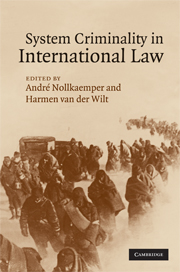Book contents
- Frontmatter
- Contents
- Preface
- Table of cases
- Table of treaties and international instruments
- List of abbreviations
- List of contributors
- 1 Introduction
- 2 The policy context of international crimes
- 3 Why corporations kill and get away with it: the failure of law to cope with crime in organizations
- 4 Men and abstract entities: individual responsibility and collective guilt in international criminal law
- 5 A historical perspective: from collective to individual responsibility and back
- 6 Command responsibility and Organisationsherrschaft: ways of attributing international crimes to the ‘most responsible’
- 7 Joint criminal enterprise and functional perpetration
- 8 System criminality at the ICTY
- 9 Criminality of organizations under international law
- 10 Criminality of organizations: lessons from domestic law – a comparative perspective
- 11 The collective accountability of organized armed groups for system crimes
- 12 Assumptions and presuppositions: state responsibility for system crimes
- 13 State responsibility for international crimes
- 14 Responses of political organs to crimes by states
- 15 Conclusions and outlook
- Index
Preface
Published online by Cambridge University Press: 08 October 2009
- Frontmatter
- Contents
- Preface
- Table of cases
- Table of treaties and international instruments
- List of abbreviations
- List of contributors
- 1 Introduction
- 2 The policy context of international crimes
- 3 Why corporations kill and get away with it: the failure of law to cope with crime in organizations
- 4 Men and abstract entities: individual responsibility and collective guilt in international criminal law
- 5 A historical perspective: from collective to individual responsibility and back
- 6 Command responsibility and Organisationsherrschaft: ways of attributing international crimes to the ‘most responsible’
- 7 Joint criminal enterprise and functional perpetration
- 8 System criminality at the ICTY
- 9 Criminality of organizations under international law
- 10 Criminality of organizations: lessons from domestic law – a comparative perspective
- 11 The collective accountability of organized armed groups for system crimes
- 12 Assumptions and presuppositions: state responsibility for system crimes
- 13 State responsibility for international crimes
- 14 Responses of political organs to crimes by states
- 15 Conclusions and outlook
- Index
Summary
This book explores the state of international law in respect of situations of system criminality, that is: situations where collective entities such as states or organised armed groups order or encourage international crimes to be committed, or permit or tolerate the committing of international crimes. The book emanated from a widely felt discomfort with the mismatch between the dominant role of collective entities in situations where international crimes are committed, on the one hand, and the current fashionable focus on individual (criminal) responsibility, exemplified by the mushroom of international criminal tribunals, on the other.
Against the background of a discussion of the mechanisms through which collective entities induce or cause international crimes to be committed, the book focuses in particular on the power and limitations of forms of international responsibilities in regard to system criminality, covering individual responsibility, responsibility of organizations and organized armed groups, and state responsibility.
While separate aspects of the role of collective entities in regard to international crimes have been subject to scholarly analysis, we felt that there was a lack of comprehensive assessments of the state of the law, the lacunas in the law of international responsibility and the prospects for strengthening the law. This book aims to fill part of the gap and contribute to an understanding of this increasingly important area of law.
The chapters in this book were originally presented at a conference held at the Amsterdam Center for International Law, University of Amsterdam, on 20 and 21 October 2006.
- Type
- Chapter
- Information
- System Criminality in International Law , pp. vii - viiiPublisher: Cambridge University PressPrint publication year: 2009



